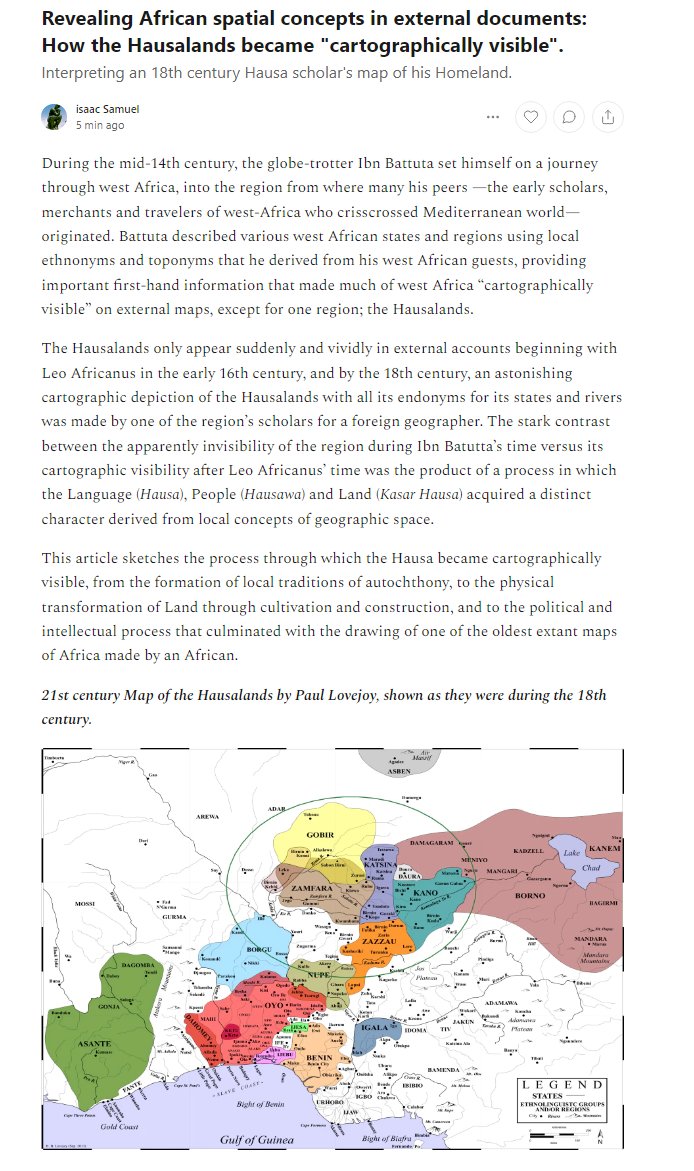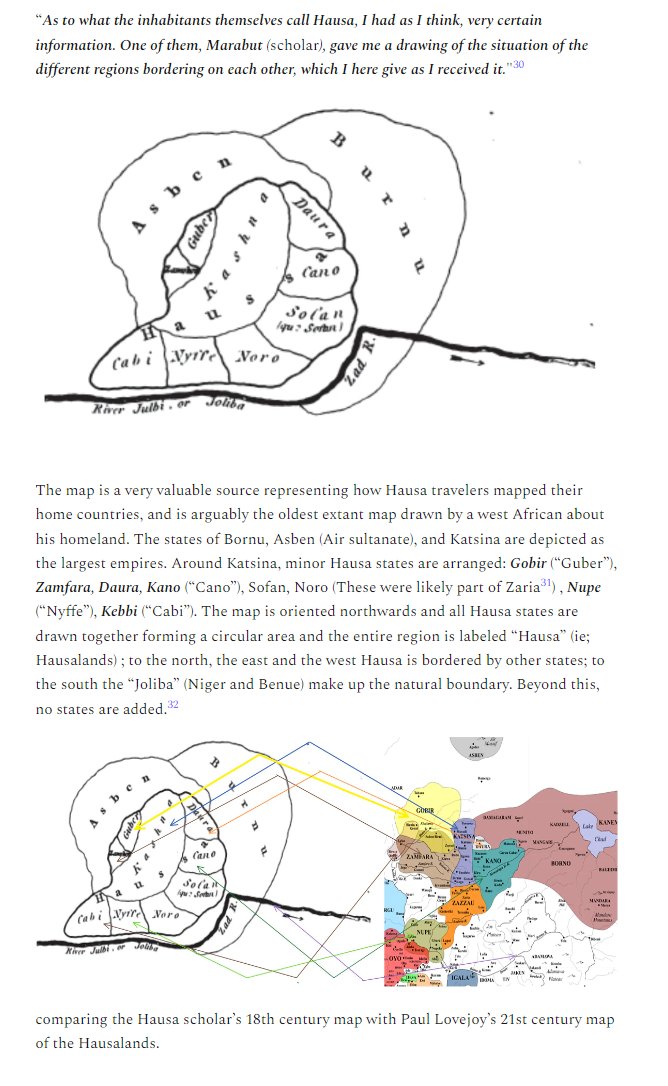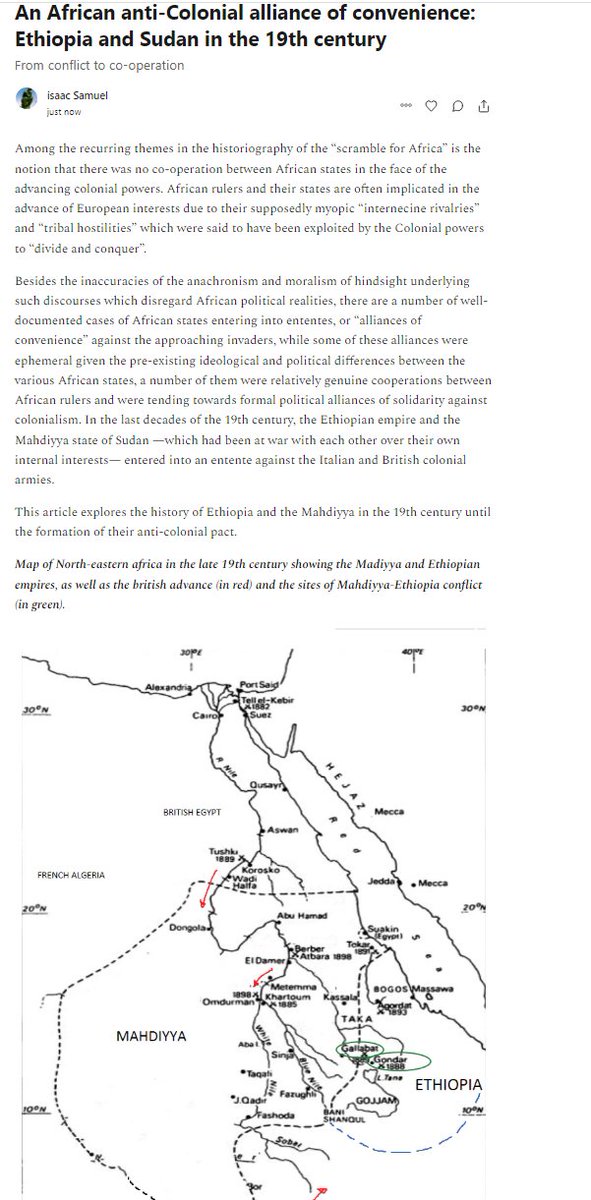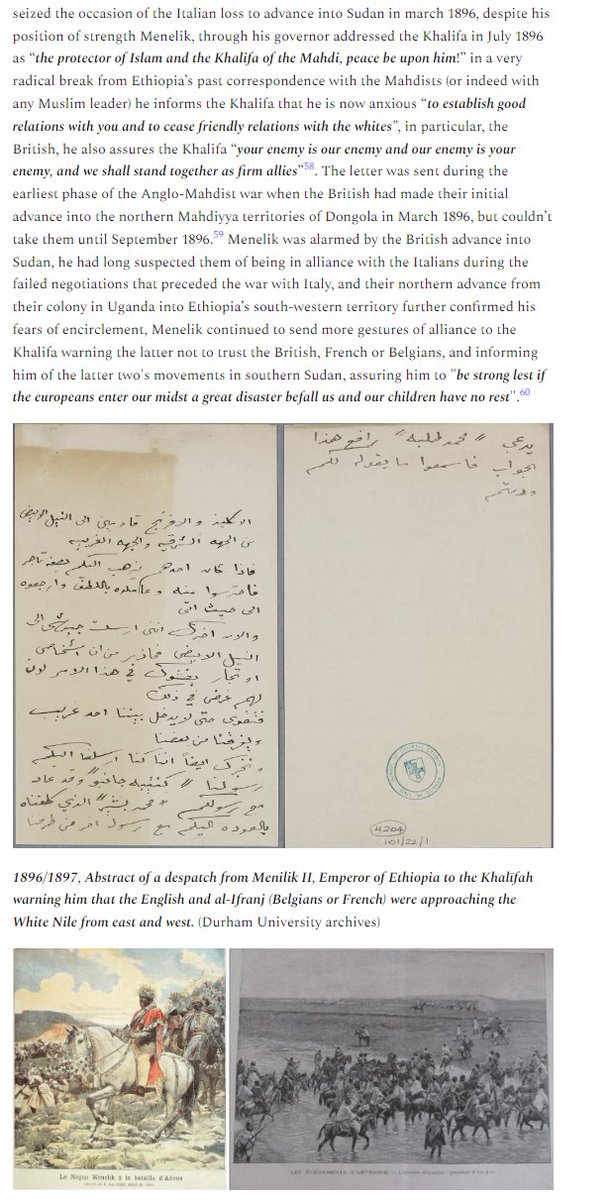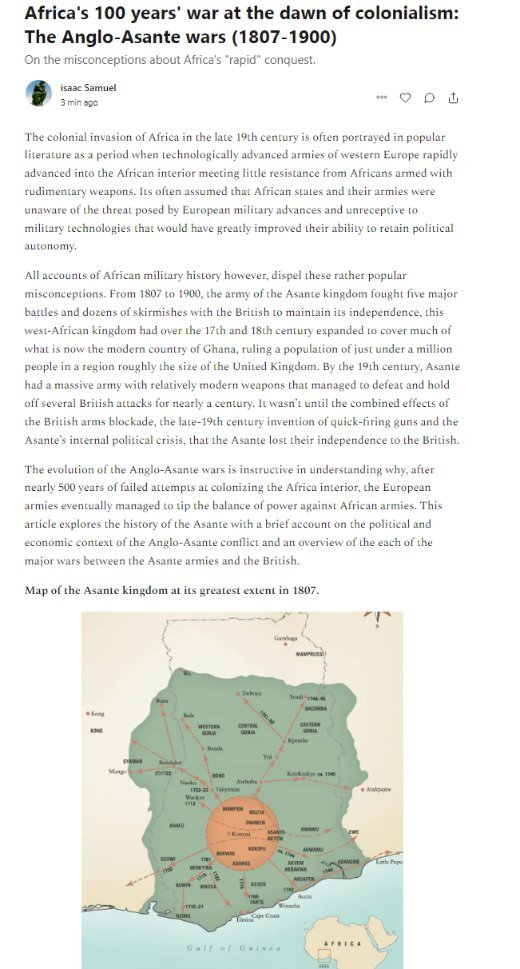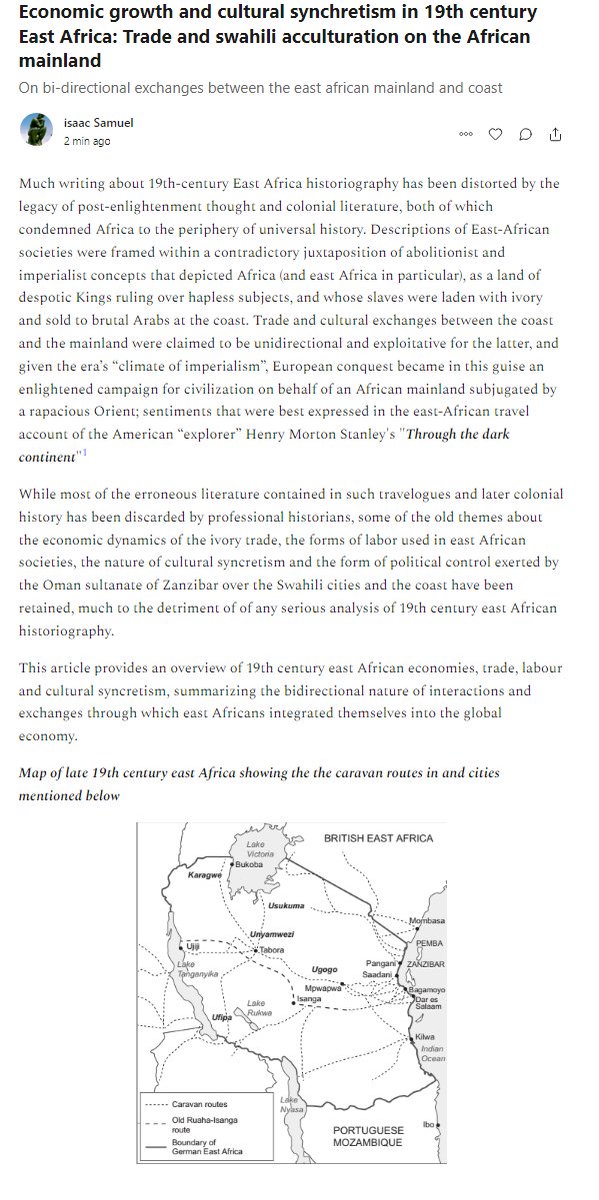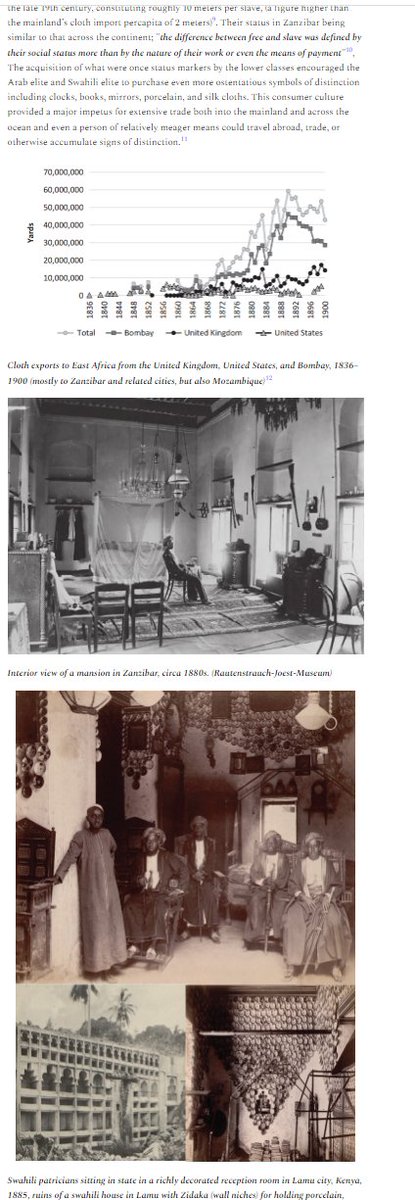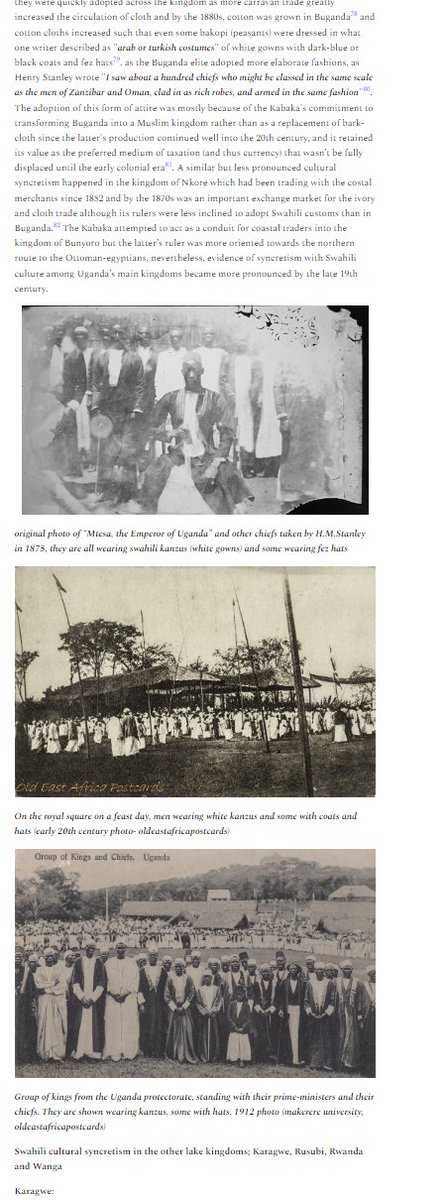
my article:
"Trans-continental trade in Central Africa: The Lunda empire's role in linking the Indian and Atlantic Worlds. (1695-1870)"
Central Africa's international trade as seen through the travelogues of African writers...
isaacsamuel.substack.com/p/trans-contin…

"Trans-continental trade in Central Africa: The Lunda empire's role in linking the Indian and Atlantic Worlds. (1695-1870)"
Central Africa's international trade as seen through the travelogues of African writers...
isaacsamuel.substack.com/p/trans-contin…


The Lunda empire pioneered a vast Trans-continental trading network extending across 4,000 km of the central African interior that linked the Atlantic coastal city of Luanda in Angola to the Indian coastal city of Zanzibar in Tanzania
isaacsamuel.substack.com/p/trans-contin…
isaacsamuel.substack.com/p/trans-contin…
The writings of two African traders who came from either side of the continent in 1806 and 1844 to visit the Lunda domains attest to its commercial hegemony, contrary to the myth of central Africa's isolation created in colonialist literature
isaacsamuel.substack.com/p/trans-contin…
isaacsamuel.substack.com/p/trans-contin…
Over the 18th century, the Lunda expanded west to (modern Angola) and east (to modern Zambia)
it controlled parts of the textile and copper belts and exporting cloth to Kasanje, and copper as far as Luanda and ultimately to Brazil
isaacsamuel.substack.com/p/trans-contin…

it controlled parts of the textile and copper belts and exporting cloth to Kasanje, and copper as far as Luanda and ultimately to Brazil
isaacsamuel.substack.com/p/trans-contin…
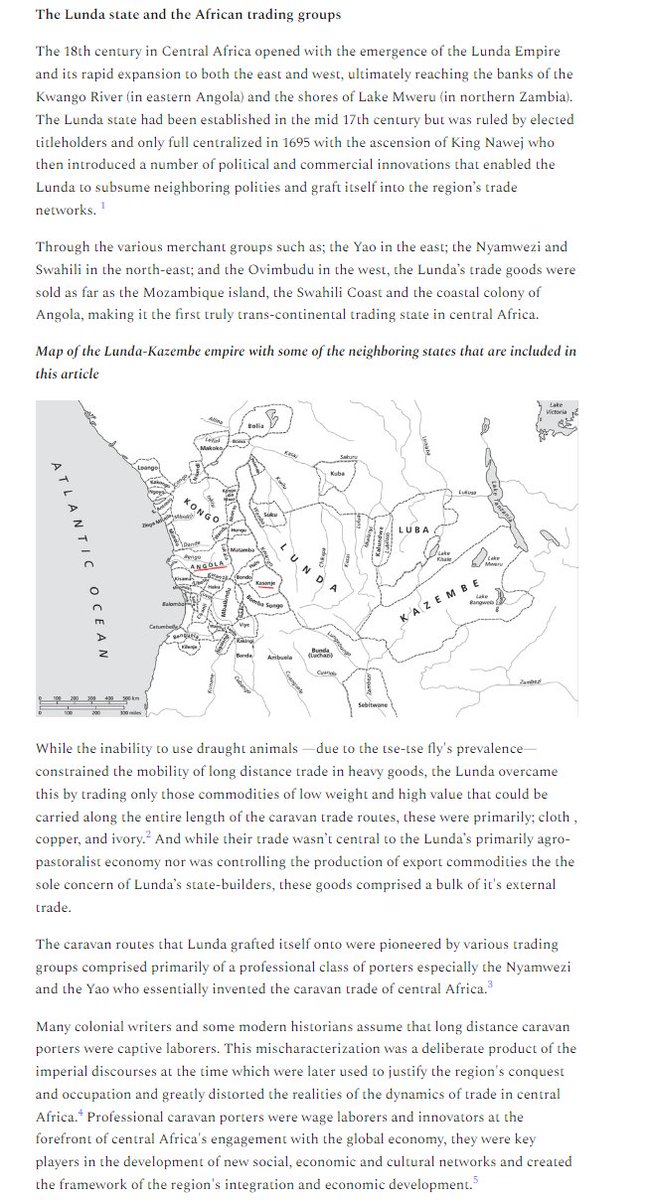
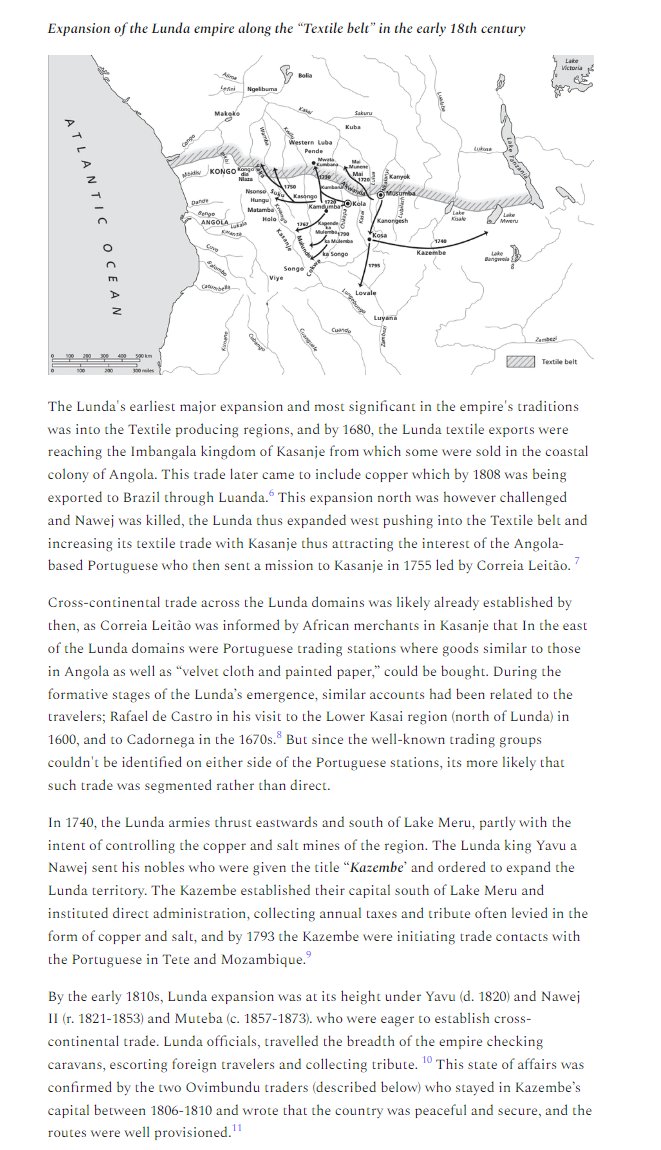
The Lunda traded relatively light but high value goods that could be carried across the entire length of the caravan route by Yao and Nyamwezi traders since central Africa's Tsetse fly prevalence constrained the use of draught animals for heavier goods
isaacsamuel.substack.com/p/trans-contin…
isaacsamuel.substack.com/p/trans-contin…
by 1740 the Lunda had reached zambia establishing the province of Kazembe
at its height, Lunda's officials travelled the breadth of the empire checking caravans, escorting foreign travelers and collecting tribute.
isaacsamuel.substack.com/p/trans-contin…

at its height, Lunda's officials travelled the breadth of the empire checking caravans, escorting foreign travelers and collecting tribute.
isaacsamuel.substack.com/p/trans-contin…
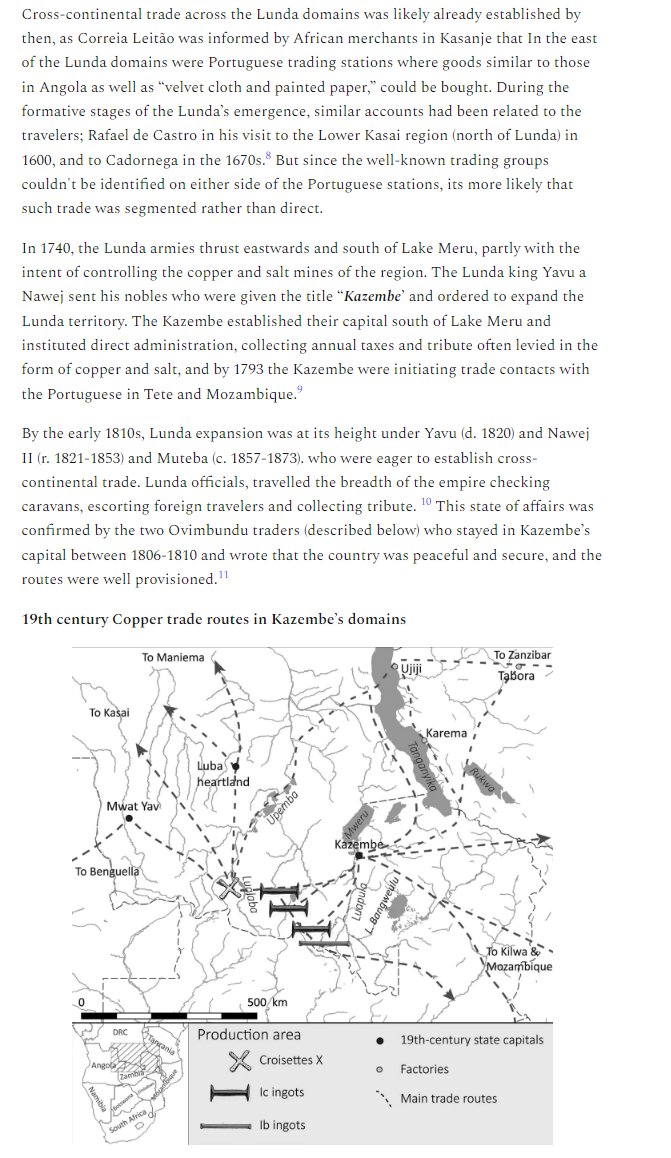
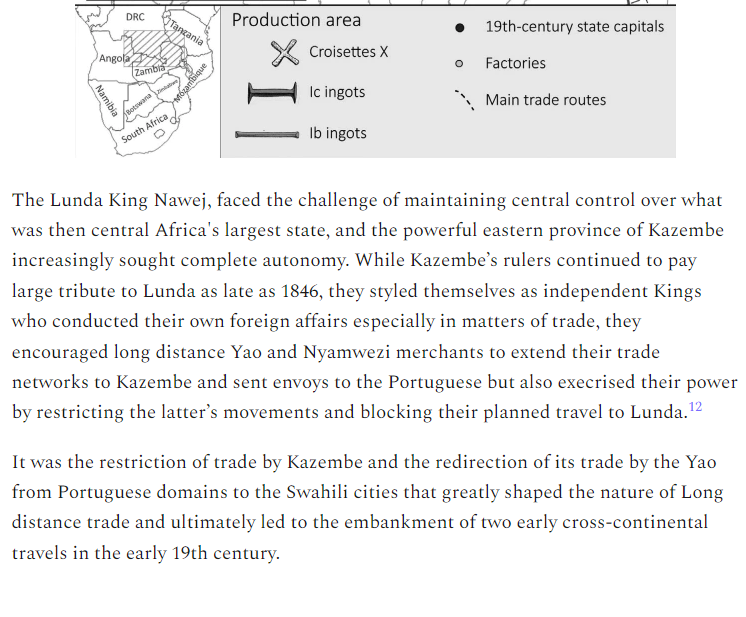
The Lunda nevertheless faced the challenge of maintaining central control especially over Kazembe which sought political autonomy, its rulers managed their own external trade and controlled the movement of traders
isaacsamuel.substack.com/p/trans-contin…
isaacsamuel.substack.com/p/trans-contin…
Kazembe's commerce with EastAfrican coast was handled by the Yao traders, initially directed towards the Portuguese port of Mozambique island, the Yao shifted their business to the Swahili at Kilwa & Zanzibar after Portuguese failure to encourage the trade
isaacsamuel.substack.com/p/trans-contin…

isaacsamuel.substack.com/p/trans-contin…
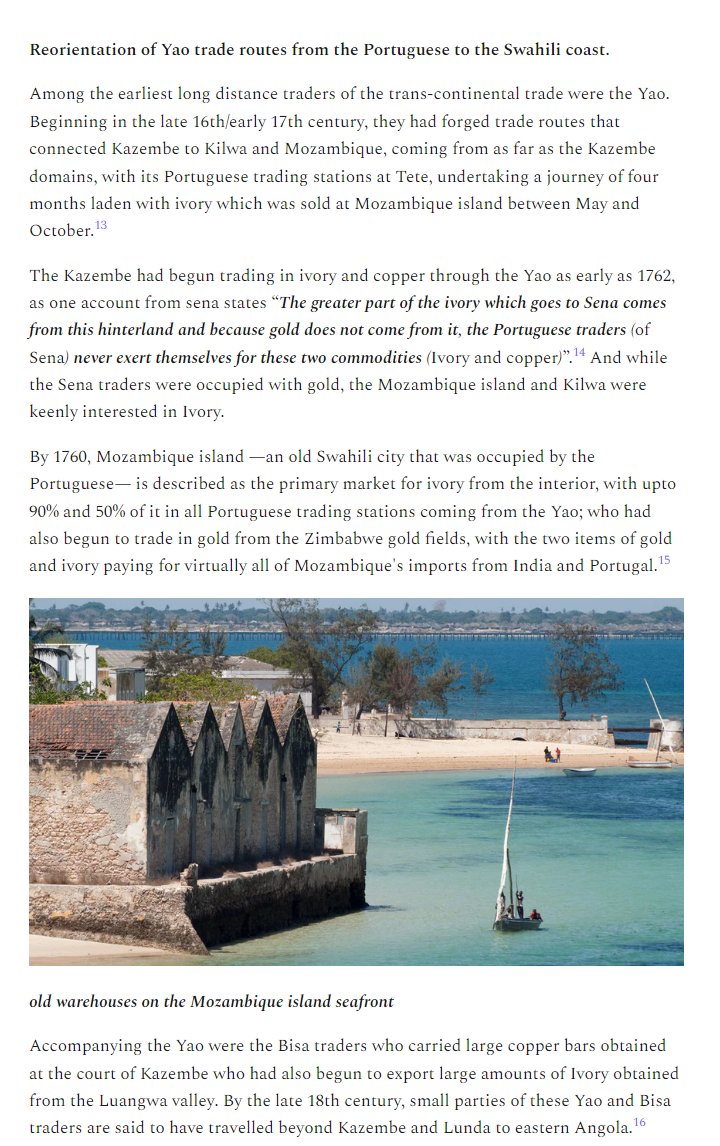
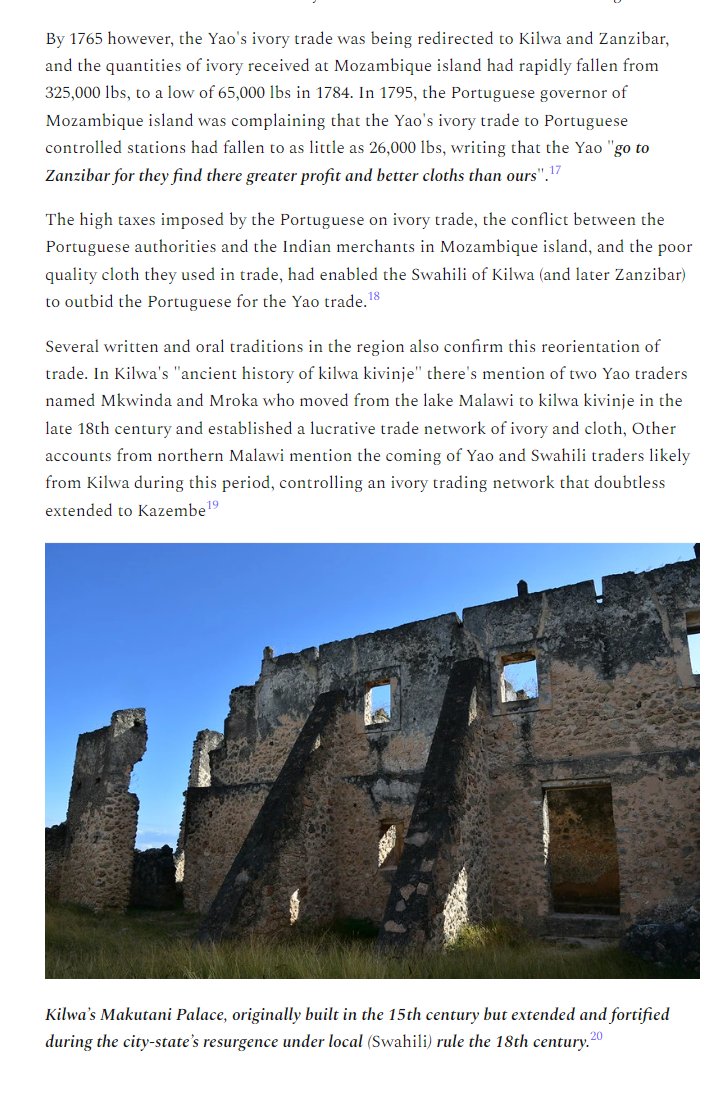
Ivory trade to the Portuguese fell from more than 140 tonnes in the 1760s to 11 tonnes in 1790s
their high taxes, conflicts with financiers and poor quality exchange goods had enabled the Swahili to outcompete them so the Yao shifted to Kilwa
isaacsamuel.substack.com/p/trans-contin…
their high taxes, conflicts with financiers and poor quality exchange goods had enabled the Swahili to outcompete them so the Yao shifted to Kilwa
isaacsamuel.substack.com/p/trans-contin…
By 1793 the Kazembe were sending envoys to the Portuguese to expand trade, and the latter sent their own envoys to Kazembe in 1798 who reported about the Swahili's outbidding of the Portuguese
the Swahili cities were by then much larger than Mozambique
isaacsamuel.substack.com/p/trans-contin…
the Swahili cities were by then much larger than Mozambique
isaacsamuel.substack.com/p/trans-contin…

More Portuguese missions were sent to Kazembe but the latter were now reluctant to trade with the Portuguese who then abandoned any hope of trans-continental trade and left it to the African merchants already active in the region such as the Ovimbundu
isaacsamuel.substack.com/p/trans-contin…
isaacsamuel.substack.com/p/trans-contin…
in 1806, two traders of Ovimbundu ancestry travelled 3,000 km across the Lunda domains
the leader named João Baptista made a detailed account of his travel, mentioning that the routes were secure and well provisioned
isaacsamuel.substack.com/p/trans-contin…
the leader named João Baptista made a detailed account of his travel, mentioning that the routes were secure and well provisioned
isaacsamuel.substack.com/p/trans-contin…
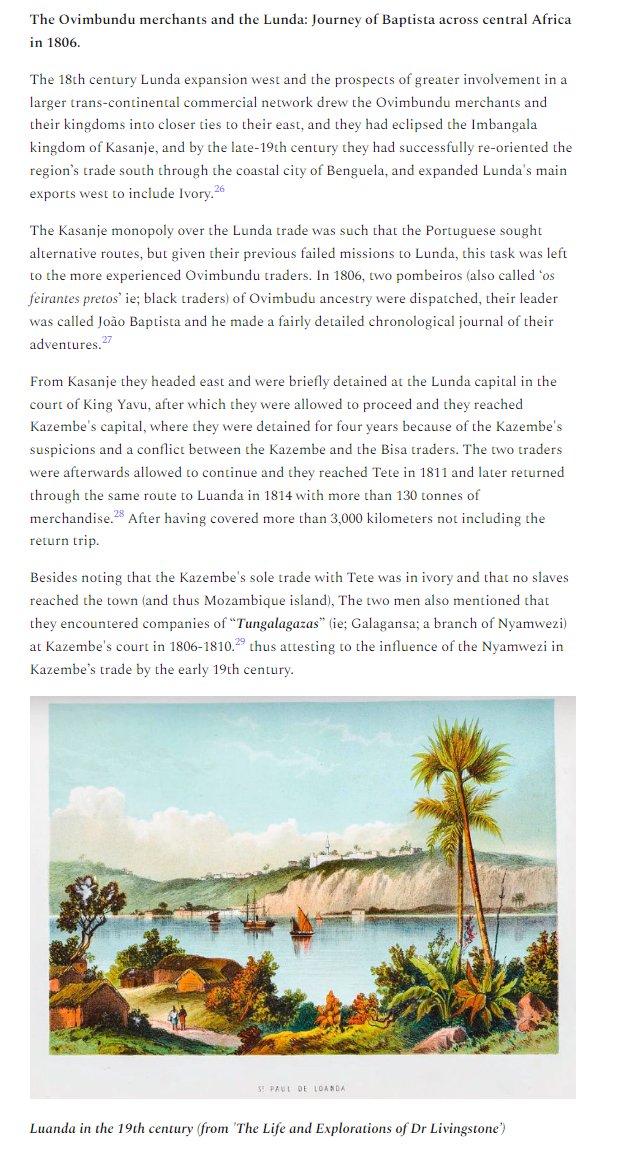
Lunda's westward expansion had attracted the Ovimbundu states to its orbit
The two traders also mentioned that there were Nyamwezi traders from eastern Africa at the Kazembe's court
isaacsamuel.substack.com/p/trans-contin…
The two traders also mentioned that there were Nyamwezi traders from eastern Africa at the Kazembe's court
isaacsamuel.substack.com/p/trans-contin…
In the 1840s, two groups of Swahili & Arab traders travelled from Kilwa & Bagamoyo on the Indian ocean coast thru the Lunda empire to Loango & Luanda on the Atlantic coast
one of them was Said, and he recorded a detailed account of his journey to Luanda
isaacsamuel.substack.com/p/trans-contin…

one of them was Said, and he recorded a detailed account of his journey to Luanda
isaacsamuel.substack.com/p/trans-contin…
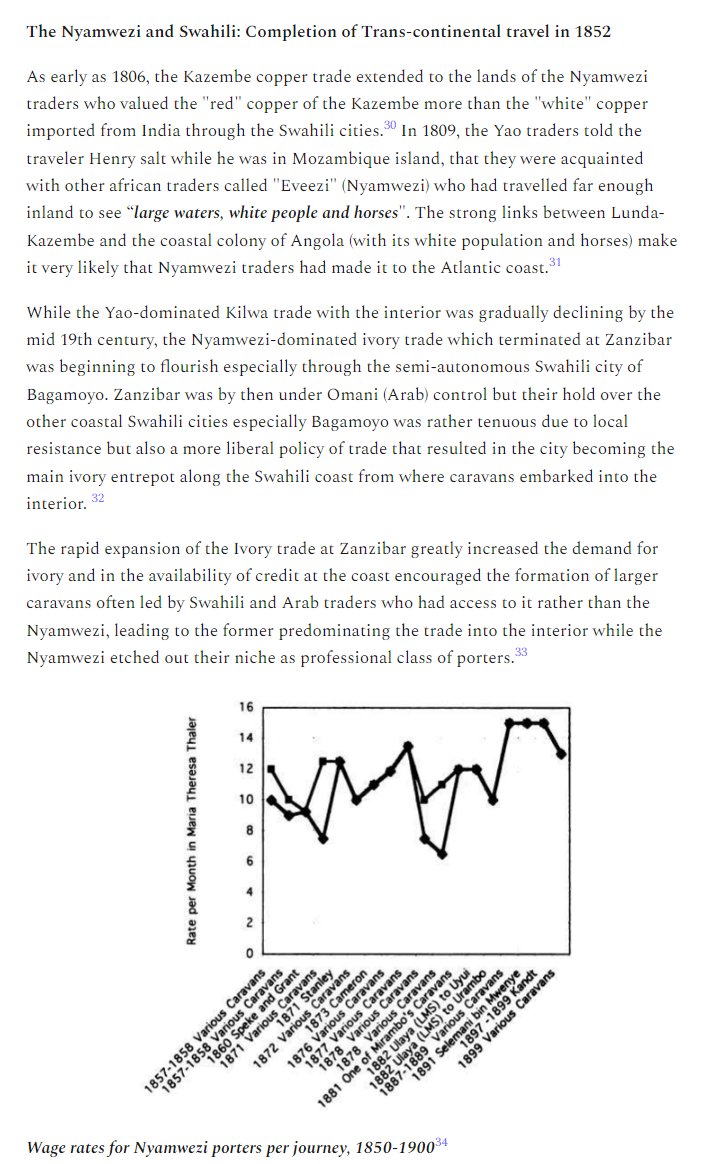
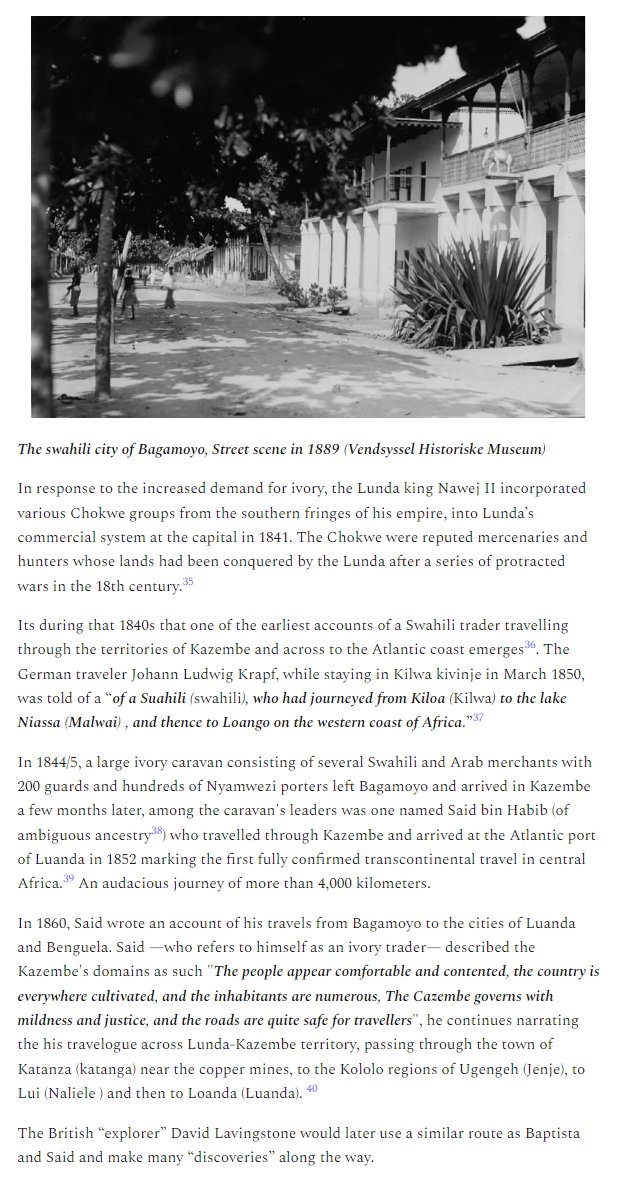
"The people appear comfortable and contented, the country is everywhere cultivated, and the inhabitants are numerous, The Cazembe governs with mildness and justice, and the roads are safe for travelers"
Said in 1860,
abt his travel from Zanzibar to Luanda
isaacsamuel.substack.com/p/trans-contin…
Said in 1860,
abt his travel from Zanzibar to Luanda
isaacsamuel.substack.com/p/trans-contin…
Succession disputes plagued the Lunda in the 1870s, as rival contenders used external actors like the Chokwe as mercenaries, but the latter established their own hegemony over the Lunda
north of Lunda, the Yeke kingdom inherited the former's copper trade
isaacsamuel.substack.com/p/trans-contin…
north of Lunda, the Yeke kingdom inherited the former's copper trade
isaacsamuel.substack.com/p/trans-contin…
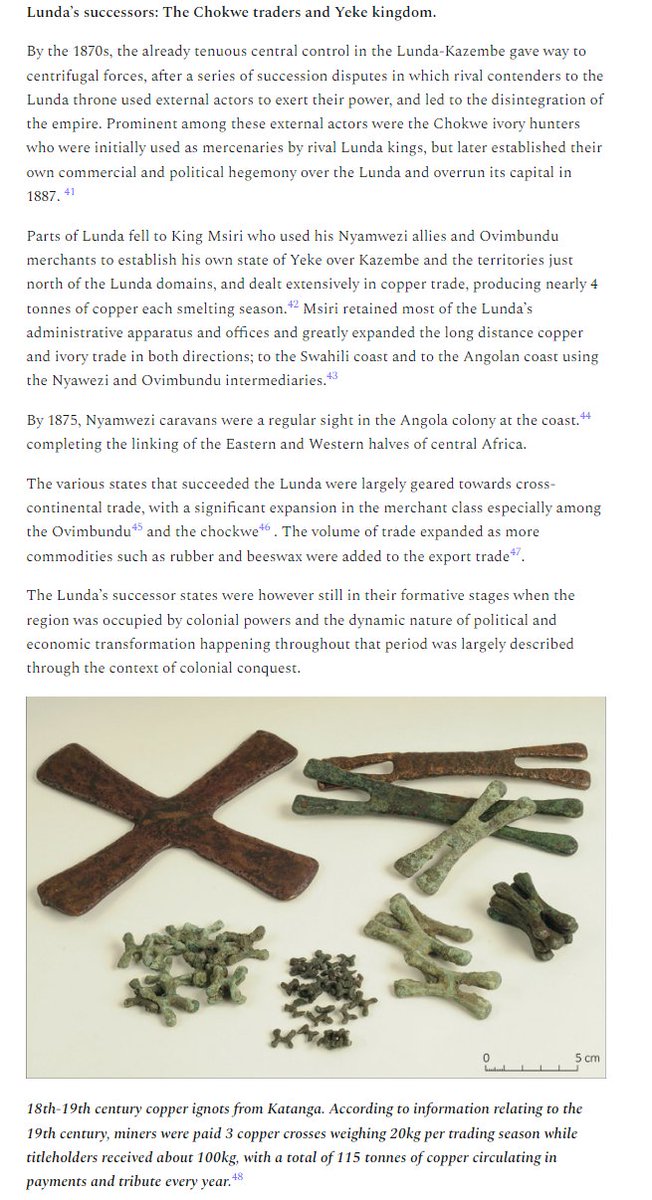
By 1875, Nyamwezi caravans were a regular sight on the Angolan coast; completing the linking of the Eastern & Western halves of central Africa
Merchant class of Ovimbundu & Chokwe expanded, export goods now included rubber & wax
shortly before colonialism
isaacsamuel.substack.com/p/trans-contin…
Merchant class of Ovimbundu & Chokwe expanded, export goods now included rubber & wax
shortly before colonialism
isaacsamuel.substack.com/p/trans-contin…
the networks and routes explorers used were created by and for the Lunda, and were recorded in internal (African) written accounts more than half a century before Livingstone and his peers "discovered" them
isaacsamuel.substack.com/p/trans-contin…
isaacsamuel.substack.com/p/trans-contin…
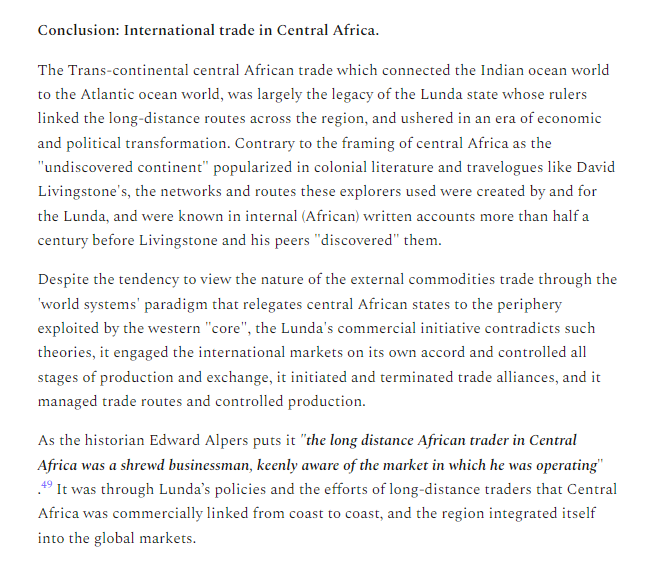
*
The travelogue of Said through central Africa in 1860 was only the first among dozens written by Swahili scholars
in 1897 a Swahili traveler named Selim Abakari recorded his journey through Europe as far Russia,
you can read about it here
patreon.com/posts/journey-…
The travelogue of Said through central Africa in 1860 was only the first among dozens written by Swahili scholars
in 1897 a Swahili traveler named Selim Abakari recorded his journey through Europe as far Russia,
you can read about it here
patreon.com/posts/journey-…
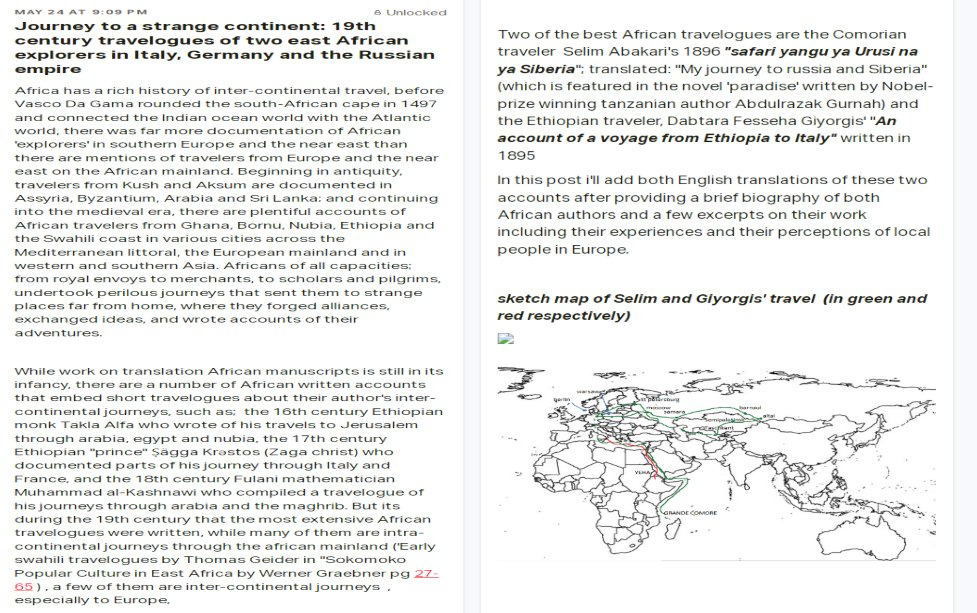
*related
"Economic growth and cultural syncretism in 19th century East Africa: Trade and Swahili acculturation on the African mainland"
On bi-directional exchanges between the east african mainland and coast
isaacsamuel.substack.com/p/economic-gro…
"Economic growth and cultural syncretism in 19th century East Africa: Trade and Swahili acculturation on the African mainland"
On bi-directional exchanges between the east african mainland and coast
isaacsamuel.substack.com/p/economic-gro…
• • •
Missing some Tweet in this thread? You can try to
force a refresh


